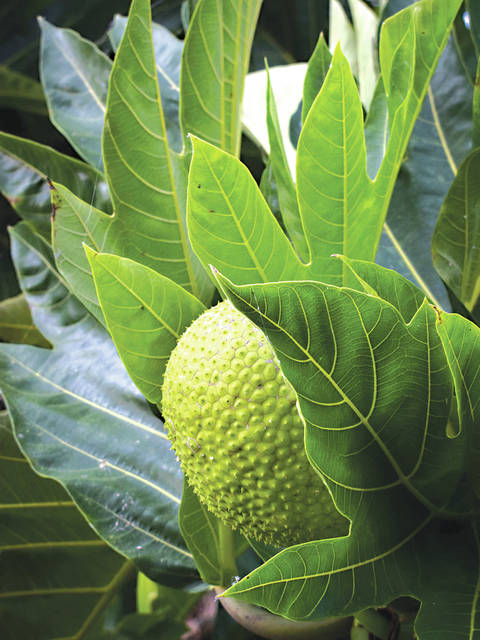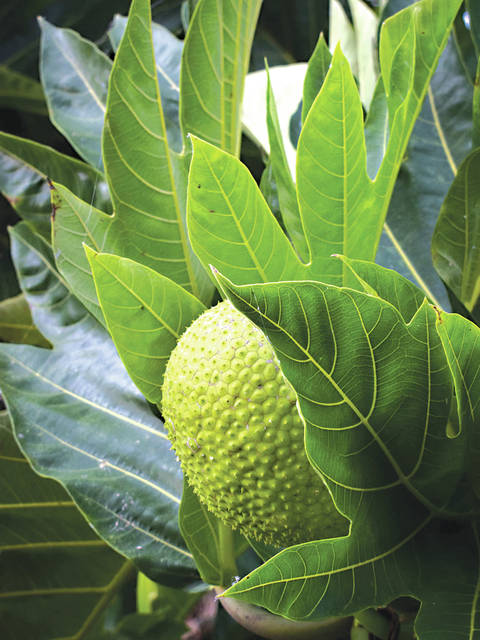Big Island farms receive cash awards: Kamehameha Schools presents Mahi‘ai Scale-Up prizes
Mala Kalu‘ulu, a cooperative business in Ke‘ei that cultivates ‘ulu (breadfruit) and ‘olena (turmeric), was awarded the 2017 Mahi‘ai Scale-Up grand prize of $20,000 by Kamehameha Schools and the Pauahi Foundation during the Hawaii Food &Wine Festival’s Raw &Wild in the Tank event Nov. 1 in Honolulu.
ADVERTISING
Mala Kalu‘ulu farms uses principles developed by Hawaiians applied to contemporary agriculture,
Kaunamano Farm, a Hilo-based producer of Berkshire hogs and that uses a holistic approach predicated on pasture management and rotational open-air grazing, earned the Mahi‘ai Scale-Up People’s Choice Award of $10,000 via a live vote by event attendees.
Hawaiian culture is a foundation of Kamehameha Schools’ educational mission. Mahi‘ai Scale-Up is one of the ways KS strives to responsibly steward approximately 364,000 acres of land, on which agriculture plays a significant role.
The Mahi‘ai Scale-Up agricultural business plan contest showcases KS’ agricultural initiatives and highlights farmers and entrepreneurs using the ‘aina. KS and PF took the successful Mahi‘ai Match-Up agricultural business plan contest to the next level via Mahi‘ai Scale-Up in an ongoing effort to support the state’s sustainable agriculture movement, and ongoing education and training for this new generation of farmers.
“We have our own farm, but also represent 27 additional breadfruit farmers, so it helps build a movement — it’s a collective dream that’s coming true,” said Noa Lincoln, who operates Mala Kalu‘ulu with his wife, Dana Shapiro.
Mahi‘ai Scale-Up targets seasoned individuals and entities within the agricultural industry and challenges them to expand their operation by implementing a new program or initiative that enhances the business. Through this initiative, KS plays a major role in decreasing Hawaii’s dependence on imported food and agriculture products.
“We need to look at sustainability not as a flavor, or as a marketing buzz word, but as a history of the Native Hawaiian people who were able to live in these islands while thriving and being successful in the most isolated land mass in the world,” said Brandon Lee, who operates Kaunamano Farm with Ka‘ikena Scanlan.
“The Mahi‘ai Scale-Up allows us to let everybody know what we’re doing on the farm, and it’s great for Hawaii,” Lee said.
‘Aina Pono Livestock &Land Maintenance LLC, a Hilo-based company that raises goats and sheep for food consumption and to keep as pets, was among the Mahi‘ai Scale-Up semifinalists.
Big Island farms receive cash awards: Kamehameha Schools presents Mahi‘ai Scale-Up prizes
Mala Kalu‘ulu, a cooperative business in Ke‘ei that cultivates ‘ulu (breadfruit) and ‘olena (turmeric), was awarded the 2017 Mahi‘ai Scale-Up grand prize of $20,000 by Kamehameha Schools and the Pauahi Foundation during the Hawaii Food &Wine Festival’s Raw &Wild in the Tank event Nov. 1 in Honolulu.
Mala Kalu‘ulu farms uses principles developed by Hawaiians applied to contemporary agriculture,
ADVERTISING
Kaunamano Farm, a Hilo-based producer of Berkshire hogs and that uses a holistic approach predicated on pasture management and rotational open-air grazing, earned the Mahi‘ai Scale-Up People’s Choice Award of $10,000 via a live vote by event attendees.
Hawaiian culture is a foundation of Kamehameha Schools’ educational mission. Mahi‘ai Scale-Up is one of the ways KS strives to responsibly steward approximately 364,000 acres of land, on which agriculture plays a significant role.
The Mahi‘ai Scale-Up agricultural business plan contest showcases KS’ agricultural initiatives and highlights farmers and entrepreneurs using the ‘aina. KS and PF took the successful Mahi‘ai Match-Up agricultural business plan contest to the next level via Mahi‘ai Scale-Up in an ongoing effort to support the state’s sustainable agriculture movement, and ongoing education and training for this new generation of farmers.
“We have our own farm, but also represent 27 additional breadfruit farmers, so it helps build a movement — it’s a collective dream that’s coming true,” said Noa Lincoln, who operates Mala Kalu‘ulu with his wife, Dana Shapiro.
Mahi‘ai Scale-Up targets seasoned individuals and entities within the agricultural industry and challenges them to expand their operation by implementing a new program or initiative that enhances the business. Through this initiative, KS plays a major role in decreasing Hawaii’s dependence on imported food and agriculture products.
“We need to look at sustainability not as a flavor, or as a marketing buzz word, but as a history of the Native Hawaiian people who were able to live in these islands while thriving and being successful in the most isolated land mass in the world,” said Brandon Lee, who operates Kaunamano Farm with Ka‘ikena Scanlan.
“The Mahi‘ai Scale-Up allows us to let everybody know what we’re doing on the farm, and it’s great for Hawaii,” Lee said.
‘Aina Pono Livestock &Land Maintenance LLC, a Hilo-based company that raises goats and sheep for food consumption and to keep as pets, was among the Mahi‘ai Scale-Up semifinalists.



